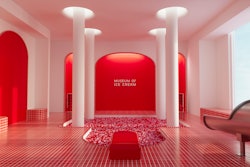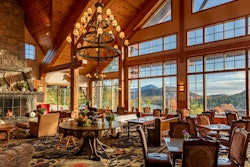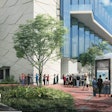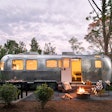
In Case You Missed It
We rounded up buzzy new venues that have opened recently in Atlanta, Austin, Boston, Chicago, Dallas/Fort Worth, Houston/San Antonio, Las Vegas, Los Angeles, Miami, Nashville, New York, Orlando/Central Florida, Phoenix/Scottsdale, San Diego, San Francisco, Seattle, Washington, D.C., and Eastern and Western Canada. Which new spot are you most excited about?
Here are five more things to know this month...
1. The hospitality industry is prioritizing neuroinclusive environments.
Marriott International Inc. has announced its commitment to incorporating neuroinclusive practices at Marriott-hosted customer events of 250 people or more globally. It's a result of joining forces with The Neu Project, an initiative from Google’s Experience Institute (Xi) that aims to share resources designed to better accommodate neurodivergent event attendees, including those with ADHD, obsessive-compulsive disorder, autism, dyslexia, epilepsy, and Tourette syndrome. The new initiative will include dedicated quiet rooms for guests experiencing sensory overwhelm; tools and resources like sensory toys, noise-canceling earplugs, warnings about loud music or surprise moments, and more; and closed captioning for main stage presentations.
“The Neu Project was born out of a desire to rethink event experiences post-pandemic, and has since grown into a major initiative that is driving change at events across industries,“ said Megan Henshall, Google's global events strategic solutions lead. “Marriott understands that creating environments where differing perspectives and experiences can come together boosts creativity, and we have witnessed their passion for increasing inclusivity at meetings and events."  Marriott's dedicated quiet rooms serve as a calming retreat where guests can break from the event to manage fatigue, overload, and/or sensory needs.Photo: Courtesy of Marriott International
Marriott's dedicated quiet rooms serve as a calming retreat where guests can break from the event to manage fatigue, overload, and/or sensory needs.Photo: Courtesy of Marriott International
And it's not just hotels working to create more inclusive environments: Visit Anaheim, the California city’s official destination organization, is now a Certified Autism Center, a designation granted by the International Board of Credentialing and Continuing Education Standards. This means the organization’s staff has completed specialized training and a certification process to better understand and assist autistic and sensory-sensitive visitors; it's the first step in the city's initiative to make Anaheim a fully Certified Autism Destination.
2. This hotel brand is launching a new virtual concierge service.
Renaissance Hotels is introducing a new virtual concierge service called RENAI by Renaissance (pronounced “ren-A”), which stands for Renaissance Artificial Intelligence. The service, currently in a pilot program at select hotels, provides instant access to local recommendations for dining, attractions, and more via a blend of AI and human touch. How it works: Knowledge hotel associates (or "navigators") have provided their expertise to train RENAI by Renaissance with their top picks, while ChatGPT and other reputable open-source outlets have also contributed recommendations—resulting in a constantly refreshed directory that's been vetted by humans.
Renaissance Hotels plans to expand RENAI to over 20 properties by March 2024. “We were already in the process of evolving our signature navigator program when technology leaps presented a serendipitous opportunity to fuse our navigators’ human insights with time-saving technology," said Eddie Schneider, Renaissance Hotels' global brand director. "With today’s travelers having access to an overwhelming amount of information, our goal is to help them cut through the clutter and provide a personalized guest experience with regularly updated tips for local discovery.”
3. A new platform is renting out rare and historic sites—many for the first time.
Phoenix-based experiential agency Cloth & Flame has launched Open Venues, a platform that lets users book rare and historic properties and landscapes for events. Currently, the platform boasts 25 venues, including a hilltop in Malibu, Calif.; a cave in Moab, Utah; a historic hotel in Jerome, Ariz.; and other spots throughout the Southwest. Each of the venues is only bookable through the platform, with many being made available for event booking for the first time. Users are connected with a dedicated concierge who can guide them through the booking process and help facilitate the event from start to finish.
“At its core, Open Venues is a love letter to the world’s most beautiful places. It was created to nurture lasting connections between people and place,” said Matt Cooley, co-founder of Open Venues. “Our goal is to help create magical memories while simultaneously protecting and respecting the destinations. We’re seeking to not only curate spectacular venues, but to build a community of people who care about these spaces as much as we do."  Events at Utah's Moab Caves start with an off-road Jeep ride to the sandstone caves.Photo: Courtesy of Open Venues
Events at Utah's Moab Caves start with an off-road Jeep ride to the sandstone caves.Photo: Courtesy of Open Venues
4. A London venue now features carbon impact info alongside each menu item.
BMA House, an event venue in London, has significantly enhanced its sustainable catering services in collaboration with caterer Company of Cooks. The partnership has led to several innovative changes—including carbon impact menus, which transparently display the carbon impact of each item. The approach allows event organizers and attendees to make conscious choices that align with their individual carbon reduction goals. Developed in collaboration with Foodsteps, the menus are rated on an A-to-E scale, with A representing the most environmentally conscious option.
The venue has also limited beef products from all menus—replacing them with creative alternatives—as well as developed partnerships with local growers and suppliers and worked with Waste Knot to minimize food waste. "These achievements underscore our dedication to meeting the evolving preferences of our clients while championing sustainability,” noted Kat Winfield, BMA House’s venue manager.  BMA House offers 22 rooms for events.Photo: Courtesy of BMA House
BMA House offers 22 rooms for events.Photo: Courtesy of BMA House
5. Hotel Indigo wants to lend you a cup of sugar.
Hotel Indigo, part of IHG's Luxury & Lifestyle portfolio, has introduced a unique program called "Borrowed by Hotel Indigo" in the U.S. and U.K. This initiative allows locals living in the same area as a Hotel Indigo property to borrow everyday items like sugar, olive oil, and coffee at no cost, aiming to strengthen community ties and revive the tradition of neighborly lending. The program is a response to findings that neighborly interactions have significantly decreased, with many feeling too shy to borrow from neighbors.
The program, which kicked off in mid-November, not only offers commonly borrowed items, but also special, locally sourced products for guests, aiming to enhance the local experience and promote culinary adventures. "When our hotels join a neighborhood, we become a part of the fabric of the community," explained Carol Hoeller, the hotel brand's vice president of global brand management. "We put it at the heart of everything, and we welcome the neighborhood and its people into our space. ... With this program, we want to embody this idea of being a good neighbor and strengthen social connections with those inside and outside of our hotels.”  A new survey from Hotel Indigo revealed that people interact with their neighbors less than ever before, with 59% never having asked to borrow from their neighbor. However, the brand notes, it’s been proved that even the smallest interaction with another individual can make for happier communities.Photo: Courtesy of Hotel Indigo
A new survey from Hotel Indigo revealed that people interact with their neighbors less than ever before, with 59% never having asked to borrow from their neighbor. However, the brand notes, it’s been proved that even the smallest interaction with another individual can make for happier communities.Photo: Courtesy of Hotel Indigo



















